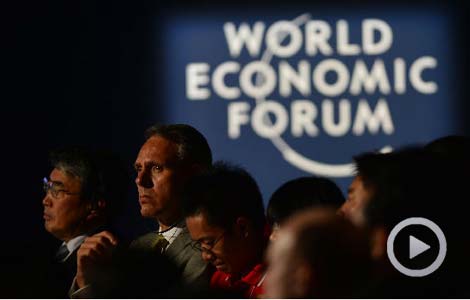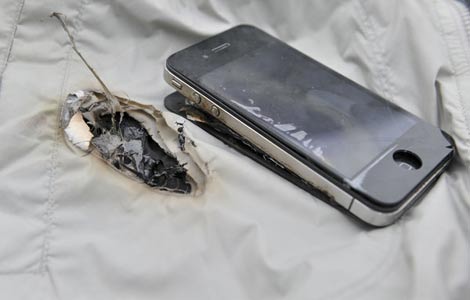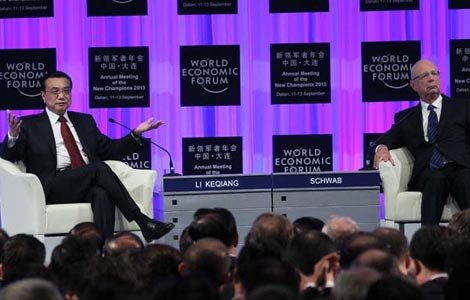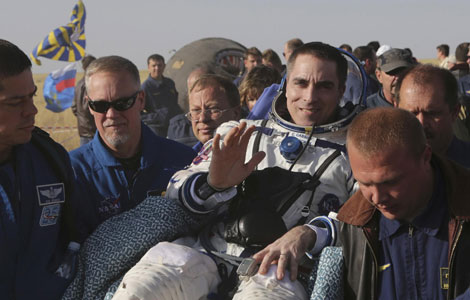Putin's proposal may save Assad and Obama
Updated: 2013-09-13 11:44
By Chen Weihua (China Daily)
|
||||||||
The Russian proposal to put Syrian chemical weapons under international control pending eventual destruction is likely to save both Syrian President Bashar al-Assad and US President Barak Obama.
That's probably why both jumped to embrace the plan on Tuesday.
For the Syrian leader, this means that his country and army can avoid a devastating air strike from the mighty US military, a strike that might tilt the balance of the civil war towards the rebels and throw Syria into further chaos.
Syrian civilians, who have already suffered in the two-and-half years of civil war, are also spared being shelled by Tomhawk cruise missiles and their collateral damage.
For Obama, the timely proposal offers him a face-saving way out of his pursuit of an unpopular military strike, a path he was forced down to defend his early threat of a red-line for chemical weapons use.
The latest Pew Center poll shows that the majority of Americans oppose the military strike and that number has been increasing. If Obama chooses to launch a strike against the will of the people, it will make him a less popular president.
Only 16 Democrat senators and 14 Democrat House members firmly support Obama's plan for limited strikes. And all signs indicate a good chance that the House will not authorize him to use force.
If Obama decides to act unilaterally without the authorization of Congress, the sour relationship between the White House and Capitol Hill will certainly get worse.
Obama has said repeatedly that he wants to focus on the economy, jobs and education. Yet his intense lobbying for military action in the past weeks has left him little time for the issues average Americans really care about.
Obama has also promised limited strikes, but there is a high likelihood that once military action begins, the US may be drawn into the Syrian civil war in order to secure its so-called national interest and prestige as a superpower.
If the US is embroiled in another prolonged war like the ones in Iraq and Afghanistan, it will cost the US taxpayers another trillion dollars, at a time when the US national debt clock is ticking towards $17 trillion.
That would be especially costly at this moment since the Obama administration may face a shutdown early next month if the Congress does not hammer out a spending plan for the next fiscal year.
By halting a potential military strike, Obama could avoid the growing international pressure over his disregard for international law and his bypassing the United Nations Security Council. So far, only a few countries such as France are likely to join the US military action against Syria.
Weighing all these factors, there is no doubt that diplomacy and a political solution are a far better option for both Assad and Obama.
It means that not only should the Syrian government seize the opportunity to put its chemical weapons under international supervision and join the Chemical Weapons Convention that bans the manufacturing, stockpiling and use of chemical weapons, but the US government should also work hard to make diplomacy work.
Diplomacy calls for patience. History shows that verifying and ultimately destroying the chemical weapons in Syria could be a long-term and not-so-easy task. After all, the US itself is behind its deadline for destroying its chemical weapons stockpiles in Colorado and Kentucky.
Calling off a US military strike may be bad news for defense companies such as Raytheon and McDonnell Douglas, manufacturers of Tomhawk missiles.
But for Assad and Obama, the Russian plan is definitely good news for themselves and their people, as well as the region and the rest of the world. Hopefully Thursday's meeting between US Secretary of State John Kerry and his Russian counterpart Sergey Lavrov in Geneva will be a good start in making the plan a reality.
The author, based in Washington, is deputy editor of China Daily USA. E-mail: chenweihua@chinadailyusa.com
(China Daily USA 09/13/2013 page16)

 Experts discuss Chinese premier's economic plan
Experts discuss Chinese premier's economic plan
 Voyager 1 has left solar system: NASA
Voyager 1 has left solar system: NASA
 Time of opportunities, challenges
Time of opportunities, challenges
 Plenty of fizz
Plenty of fizz
 Traffic about-face seeks to ease congestion
Traffic about-face seeks to ease congestion
 Another iPhone4 explodes while charging
Another iPhone4 explodes while charging
 Premier stresses transformation of the economy
Premier stresses transformation of the economy
 Soyuz capsule returns from space station
Soyuz capsule returns from space station
Most Viewed
Editor's Picks

|

|

|

|

|

|
Today's Top News
WB head to discuss climate in China visit
US moves against China firms criticized
3 sentenced to death for Xinjiang terror attack
Xi welcomes talks on Iran
Assad agrees to hand over chemical weapons
Time of opportunities, challenges
China sets caps for rare earths exploration
Ending non-tariff barriers benefits global economy
US Weekly

|

|





